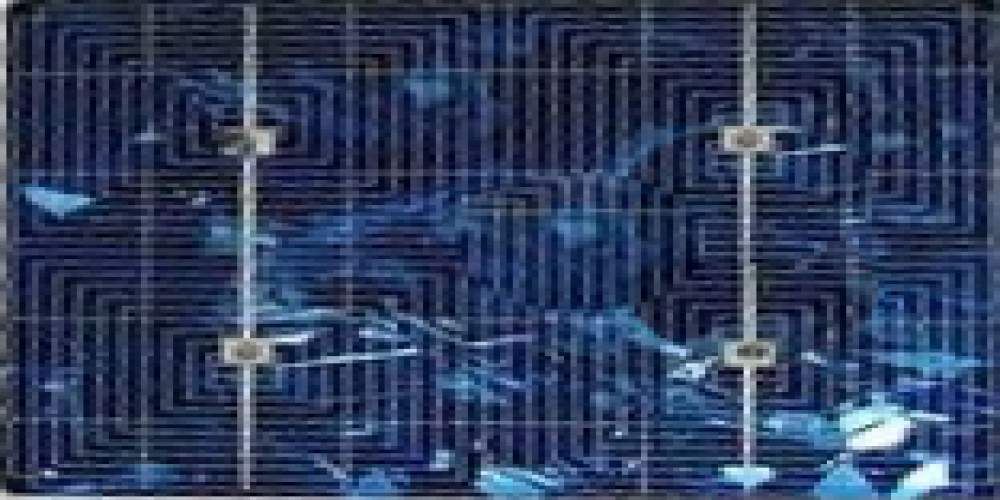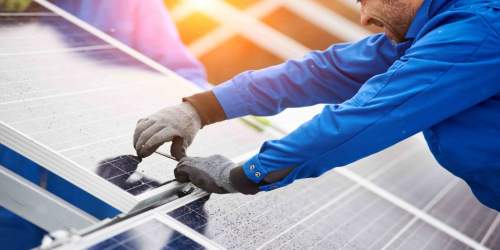Read Time : 3 Minutes
What are the different types of solar photovoltaic cells?
Types of Solar Photovoltaic Cells
Solar panels convert energy from the sun into the electricity we use in our homes, to power the lights on our streets, and the machinery in our industries. They can be seen on an industrial scale in solar farms and more discretely on the roofs of our own houses.
Solar Panels at a glance
- Most photo-voltaic solar panels are silicon based or a variation of.
- There are several different types of solar panel including tiles, film, and lightweight.
- The main difference in solar panels is the purity or alignment of the silicon. The more perfect the alignment of molecules of silicon the better it as at converting sunlight into electricity.
- Obviously, the more efficient panels are the more expensive, but this should not be your primary reason for choosing one type over another.
Monocrystalline silicon solar panels
The most effective of the solar PV cells with 15% efficiency*, monocrystalline silicon is therefore the more expensive option. They require less space than other cells simply because they produce more energy and can yield up to four times more power than thin-film solar panels. They also last longer than other panels and perform better at low light. The main disadvantage is the cost which often means that it’s not the first choice for home owners. It can also be effected by dirt or shade, which can break the circuit and the production process is often seen as wasteful because the cells have to be cut into wafers.
Monocrystalline siliconTypical efficiency 15%. One of the most effective PV cells currently available on the market, and consequently among the most expensive they are cut from a single silicon crystal. |
COMPARE PRICES FROM LOCAL INSTALLERS
Compare prices from local companies fast & free
Enter your postcode to compare quotes from leading professionals. We promise to keep your information Safe & Secure. Privacy Policy
Polycrystalline (or multi-crystalline) solar panels
With an efficiency of 13%, polycrystalline solar panels are often seen as a better economic choice, particularly for home owners. They are made from a number of smaller silicon crystals that are melted together and then recrystallized. The process to create them is simpler and less wasteful than with monocrystalline panels. They do suffer more at high heats that can reduce their lifespan but overall perform just as well as their more expensive counterpart. The main disadvantage for polycrystalline solar panels is that you need more of them because of the lower energy conversion efficiency.
Polycrystalline (or multicrystalline) siliconTypical efficiency 13%. Although cheaper to produce and slightly less efficient than monocrystalline cells, polycrystalline cells are still cost-effective, they are made from a number of smaller silicon crystals which are melted or recrystallised. |
Amorphous/thin film solar panels
At 7%, thin film solar panels are among the least efficient on the market but they are the cheapest option. They work well in low light, even moonlight, and are made from non-crystalline silicone that can be transferred in a thin film onto another material such as glass. The main advantage is that it can be mass produced at a much cheaper cost but is more suitable for situations where space is not a big issue. The main disadvantage for thin film solar panels are not generally used for residential purposes and will degrade quicker than crystalline cells.
Amorphous/thin film siliconTypical efficiency 7%. One of the least efficient cell types on the market, and consequently the cheapest. Amorphous cells work well at lower light levels and can even generate electricity from bright moonlight, they are made from non-crystalline silicon and transferred as a flexible film onto another surface such as glass. |
Hybrid silicon solar panels
With an efficiency of 18%, hybrid solar panels are made from a mix of amorphous and monocrystalline cells to generate maximum efficiency. There are a variety of types of hybrid cells and they are still very much at the research and development stage which is why they are currently a more expensive option.
 |
Hybrid siliconTypical efficiency 18%. The most expensive PV cell type available on the market, but also the most efficient, it uses a combination of monocrystalline and amorphous cells for maximum efficiency. |
Sizes and wattage
The amount of energy that your solar display produces depends on three factors: The size of the installation, the positioning and the quality of the materials used. An average home would require a 3-4 kWh system if it wants to benefit from output, efficiency and savings. How does this affect me? The type of solar panel array you can install will depend on the size of your property, the angle of your roof and the direction it points in, as well as the affordability of the core solar panel materials. You can use a simple tool to get an approximate measure of your roof size with our interactive roof measurement tool. Although prices will vary depending on circumstances, an 8m² roof would be suitable for a 1kWh system whilst a 21-28m² roof would be viable for a larger 3-4kWh solar panel system. My proposed installation Deciding on which type of solar panel to install will depend on your financial circumstances, whether you can get funding and planning permission and which will give you the best return on investment. A reputable installer will be able to gauge the best solutions to your solar panel needs and explain how to get the most out of your installation. You can search for a solar panel expert here.
The future of solar panel technology
The solar energy industry is beginning to move forward quite quickly now. With more people opting for greener ways to power their homes, the market and the consequent solar photovoltaic research and development is expanding exponentially. The search is on for cheaper and more eco-friendly solar cells including a process involving Cadmium Telluride which Liverpool University are now working hard to develop for a cheaper and less toxic alternative to making solar cells. https://www.renewableenergyhub.co.uk/blog/liverpool-finds-cheaper-solar-energy-solution/ *NB - The precise efficiency of PV panels also depends on factors such as roof orientation and inclination, and amount of shade coverage. It also must be noted that a 4kW solar array will produce 4kW regardless of the type of cells used (however the physical size may be larger using a less efficient technology).
Find a local installer
Welcome to the biggest directory of UK renewable energy companies





 How Much do Solar Panel Systems Cost in 2024?
How Much do Solar Panel Systems Cost in 2024?







